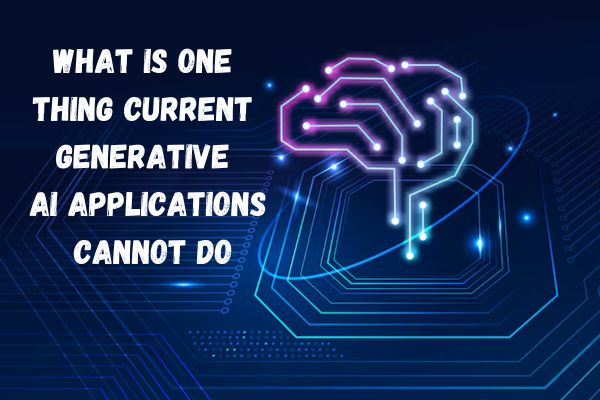Generative AI has come a long way in recent years, producing everything from realistic images to human-like text. Applications like ChatGPT, Midjourney, and DALL·E can generate high-quality content in seconds, transforming industries like marketing, design, and customer service. But despite their impressive capabilities, generative AI is far from perfect. There’s still one major limitation that AI has yet to overcome: true originality and independent reasoning.
Also See: Emotional AI for Therapy and Counseling: Transforming Mental Health Care
What is One Thing Current Generative AI Applications cannot Do?
Why AI Struggles with True Originality
AI models are trained on vast amounts of data. This data acts as the foundation for everything they generate, whether it’s text, images, or even music. However, because AI operates on existing patterns, it doesn’t “think” or “create” in the way humans do—it predicts the next word, pixel, or note based on what it has seen before.
This is why AI-generated content often feels familiar or even derivative. It can mix and match existing ideas in novel ways, but it cannot spontaneously create something entirely new. For example, an AI can write a sci-fi story that seems original, but if you analyze its plot, themes, or character archetypes, you’ll likely find traces of existing books and movies it was trained on.
The Difference Between AI and Human Creativity
Imagine a chef creating a brand-new recipe. A human chef might be inspired by various cuisines but could also invent an entirely new flavor combination based on personal experience, experimentation, and even intuition. AI, on the other hand, could generate a recipe by analyzing existing dishes and blending their elements, but it wouldn’t have a true spark of inspiration or the ability to understand what flavors might work based on experience alone.
Also See: What Purpose do Fairness Measures serve in AI Product Development
This distinction is crucial in fields like scientific research, philosophy, and art, where true breakthroughs come from deep reflection, curiosity, and an ability to challenge existing knowledge—something AI is not equipped to do.
Can AI Ever Be Truly Creative?
There’s a growing debate on whether AI can ever achieve real originality. Some argue that as models become more advanced, they will eventually develop the ability to generate truly unique ideas. Others believe that true creativity requires consciousness, something AI does not possess.
Also See: Difference Between Propositional and First Order Logic
For now, AI is best seen as a powerful tool for augmenting human creativity rather than replacing it. Writers use AI to brainstorm ideas, designers use it to create visual inspiration, and musicians use it to generate melodies. But the final touch—the real creative genius—still comes from human intuition and imagination.
Final Thoughts
AI is changing the world, but it’s not here to replace human ingenuity. While it can assist in countless ways, it cannot think independently, break from existing knowledge, or experience creativity in the same way we do. And honestly? That’s a good thing. Creativity, after all, is what makes us human.
So while AI may write a compelling story or generate a stunning image, it still relies on us—the dreamers, the artists, the inventors—to bring something truly original into the world.
